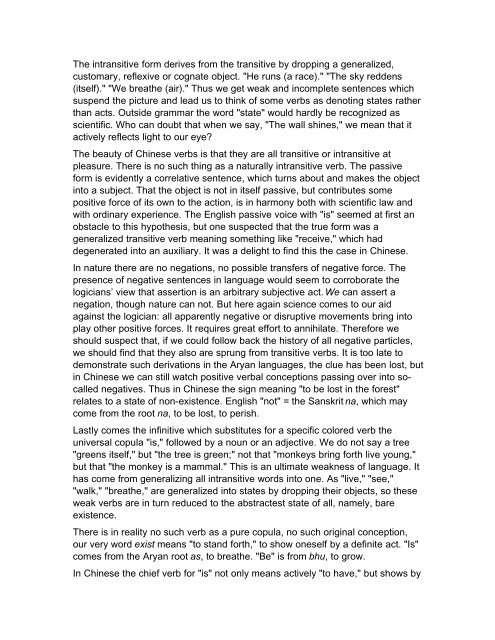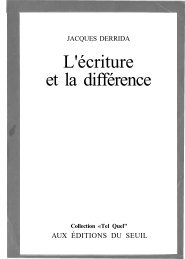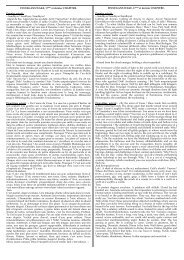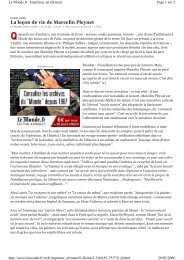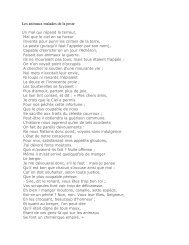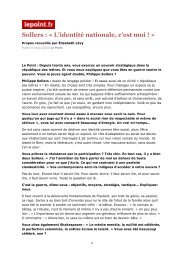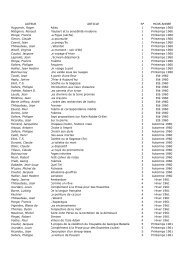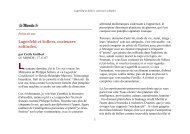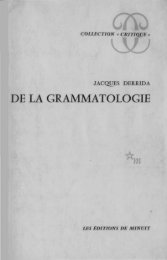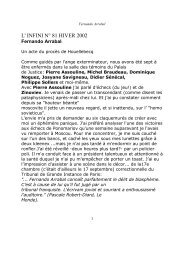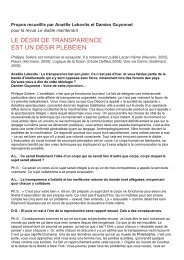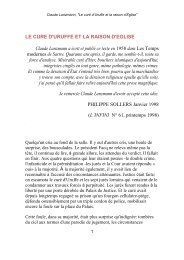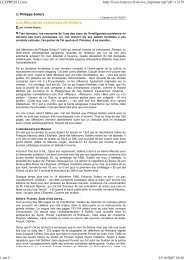The Chinese Written Character as a Medium for Poetry
The Chinese Written Character as a Medium for Poetry
The Chinese Written Character as a Medium for Poetry
You also want an ePaper? Increase the reach of your titles
YUMPU automatically turns print PDFs into web optimized ePapers that Google loves.
<strong>The</strong> intransitive <strong>for</strong>m derives from the transitive by dropping a generalized,customary, reflexive or cognate object. "He runs (a race)." "<strong>The</strong> sky reddens(itself)." "We breathe (air)." Thus we get weak and incomplete sentences whichsuspend the picture and lead us to think of some verbs <strong>as</strong> denoting states ratherthan acts. Outside grammar the word "state" would hardly be recognized <strong>as</strong>scientific. Who can doubt that when we say, "<strong>The</strong> wall shines," we mean that itactively reflects light to our eye?<strong>The</strong> beauty of <strong>Chinese</strong> verbs is that they are all transitive or intransitive atple<strong>as</strong>ure. <strong>The</strong>re is no such thing <strong>as</strong> a naturally intransitive verb. <strong>The</strong> p<strong>as</strong>sive<strong>for</strong>m is evidently a correlative sentence, which turns about and makes the objectinto a subject. That the object is not in itself p<strong>as</strong>sive, but contributes somepositive <strong>for</strong>ce of its own to the action, is in harmony both with scientific law andwith ordinary experience. <strong>The</strong> English p<strong>as</strong>sive voice with "is" seemed at first anobstacle to this hypothesis, but one suspected that the true <strong>for</strong>m w<strong>as</strong> ageneralized transitive verb meaning something like "receive," which haddegenerated into an auxiliary. It w<strong>as</strong> a delight to find this the c<strong>as</strong>e in <strong>Chinese</strong>.In nature there are no negations, no possible transfers of negative <strong>for</strong>ce. <strong>The</strong>presence of negative sentences in language would seem to corroborate thelogicians’ view that <strong>as</strong>sertion is an arbitrary subjective act. We can <strong>as</strong>sert anegation, though nature can not. But here again science comes to our aidagainst the logician: all apparently negative or disruptive movements bring intoplay other positive <strong>for</strong>ces. It requires great ef<strong>for</strong>t to annihilate. <strong>The</strong>re<strong>for</strong>e weshould suspect that, if we could follow back the history of all negative particles,we should find that they also are sprung from transitive verbs. It is too late todemonstrate such derivations in the Aryan languages, the clue h<strong>as</strong> been lost, butin <strong>Chinese</strong> we can still watch positive verbal conceptions p<strong>as</strong>sing over into socallednegatives. Thus in <strong>Chinese</strong> the sign meaning "to be lost in the <strong>for</strong>est"relates to a state of non-existence. English "not" = the Sanskrit na, which maycome from the root na, to be lost, to perish.L<strong>as</strong>tly comes the infinitive which substitutes <strong>for</strong> a specific colored verb theuniversal copula "is," followed by a noun or an adjective. We do not say a tree"greens itself," but "the tree is green;" not that "monkeys bring <strong>for</strong>th live young,"but that "the monkey is a mammal." This is an ultimate weakness of language. Ith<strong>as</strong> come from generalizing all intransitive words into one. As "live," "see,""walk," "breathe," are generalized into states by dropping their objects, so theseweak verbs are in turn reduced to the abstractest state of all, namely, bareexistence.<strong>The</strong>re is in reality no such verb <strong>as</strong> a pure copula, no such original conception,our very word exist means "to stand <strong>for</strong>th," to show oneself by a definite act. "Is"comes from the Aryan root <strong>as</strong>, to breathe. "Be" is from bhu, to grow.In <strong>Chinese</strong> the chief verb <strong>for</strong> "is" not only means actively "to have," but shows by


